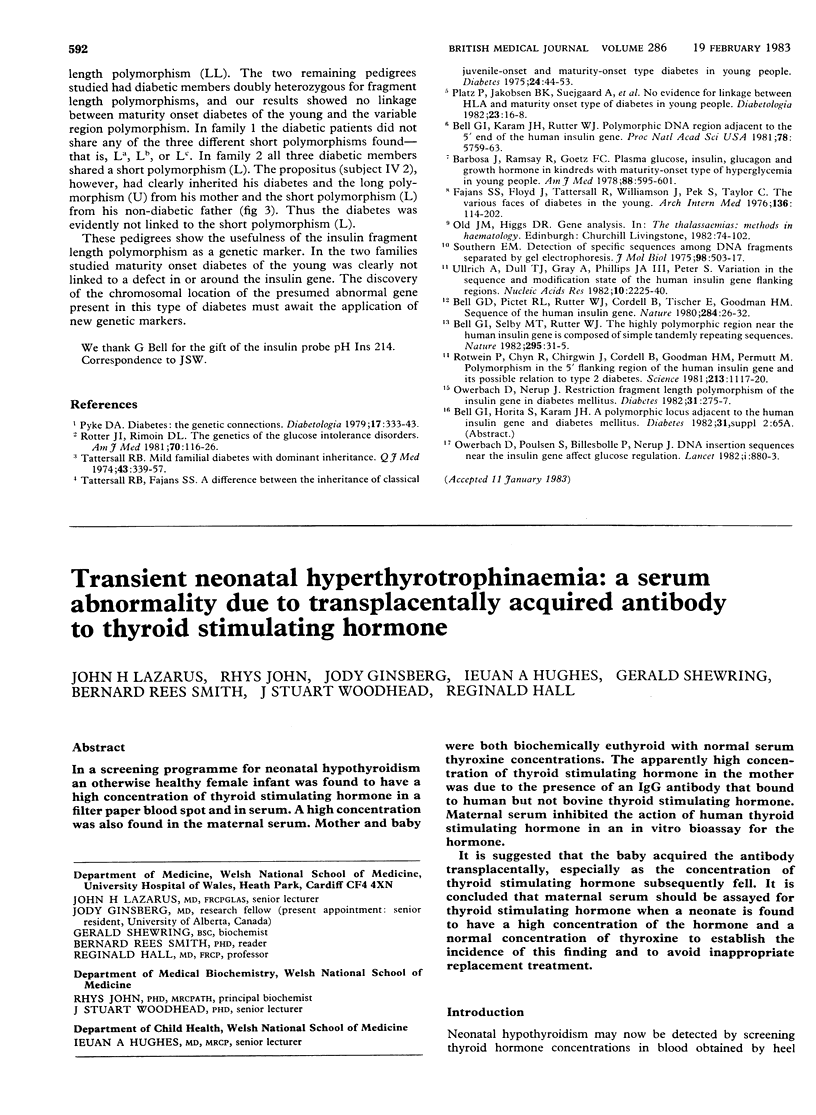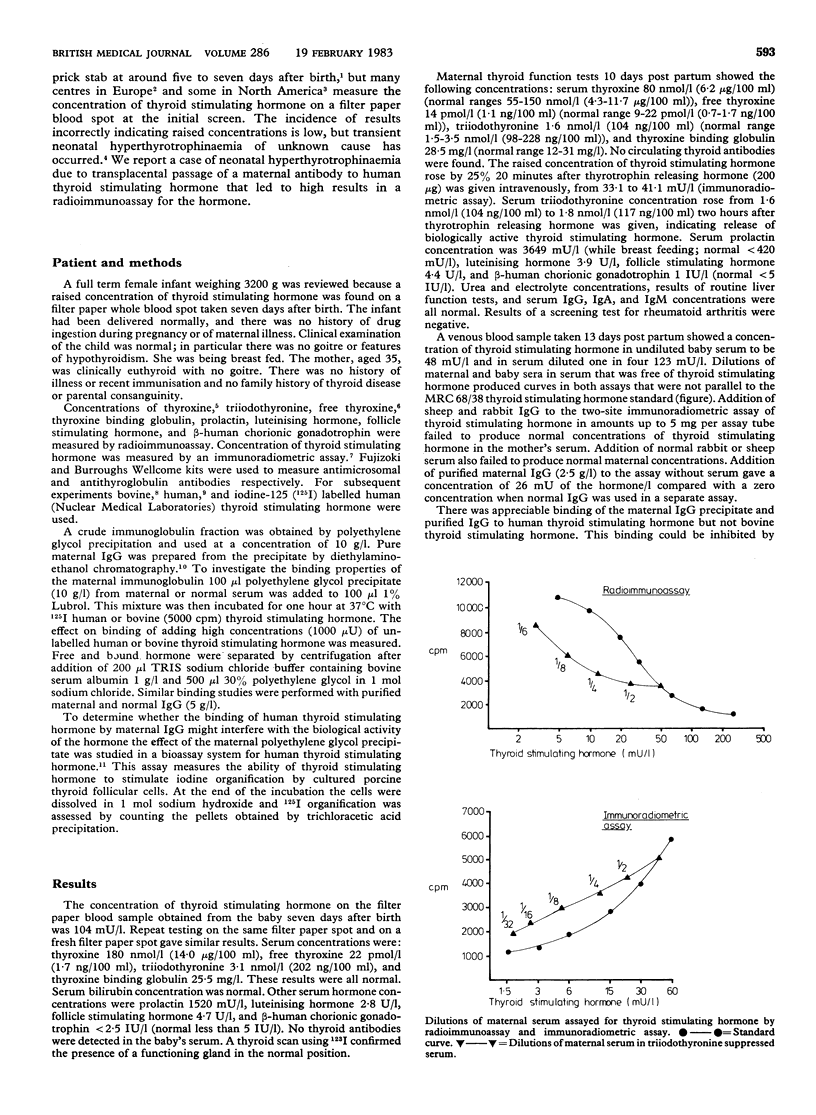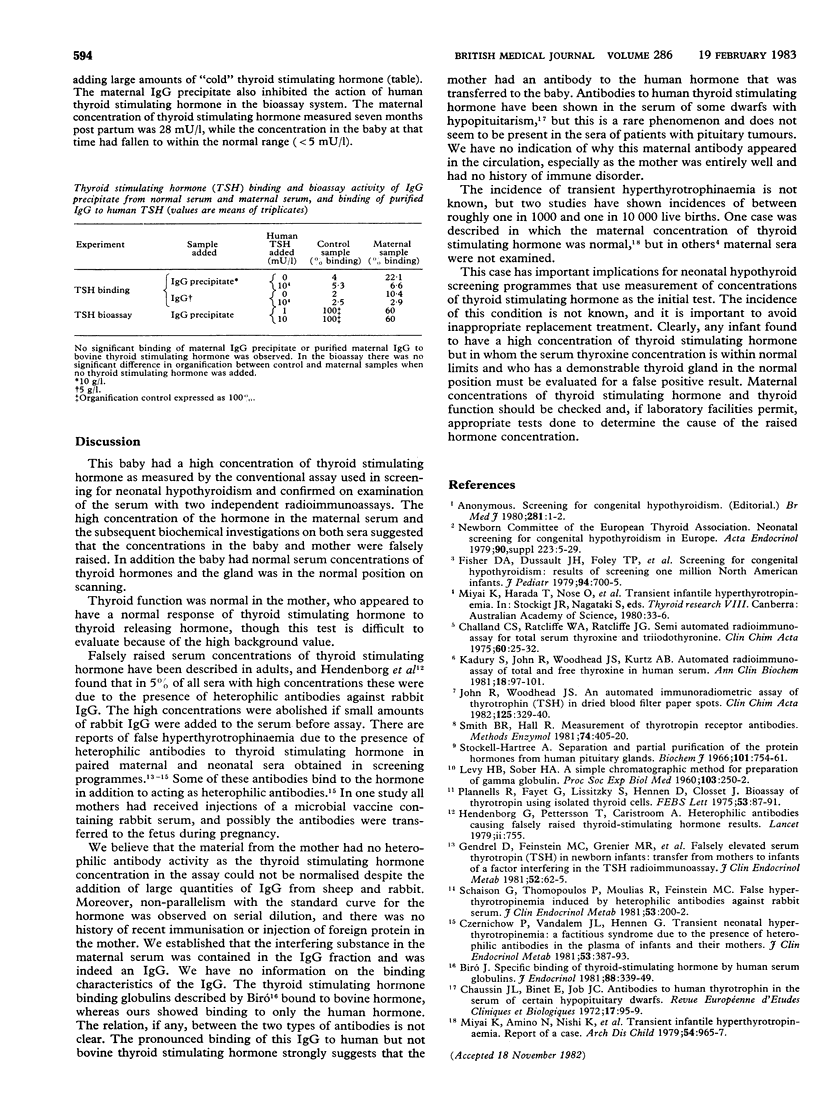Abstract
In a screening programme for neonatal hypothyroidism an otherwise healthy female infant was found to have a high concentration of thyroid stimulating hormone in a filter paper blood spot and in serum. A high concentration was also found in the maternal serum. Mother and baby were both biochemically euthyroid with normal serum thyroxine concentrations. The apparently high concentration of thyroid stimulating hormone in the mother was due to the presence of an IgG antibody that bound to human but not bovine thyroid stimulating hormone. Maternal serum inhibited the action of human thyroid stimulating hormone in an in vitro bioassay for the hormone. It is suggested that the baby acquired the antibody transplacentally, especially as the concentration of thyroid stimulating hormone subsequently fell. It is concluded that maternal serum should be assayed for thyroid stimulating hormone when a neonate is found to have a high concentration of the hormone and a normal concentration of thyroxine to establish the incidence of this finding and to avoid inappropriate replacement treatment.
Full text
PDF


Selected References
These references are in PubMed. This may not be the complete list of references from this article.
- Challand G. S., Ratcliffe W. A., Ratcliffe J. G. Semi-automated radioimmunoassays for total serum thyroxine and triiodothyronine. Clin Chim Acta. 1975 Apr 2;60(1):25–32. doi: 10.1016/0009-8981(75)90176-x. [DOI] [PubMed] [Google Scholar]
- Chaussain J. L., Binet E., Job J. C. Antibodies to human thyreotrophin in the serum of certain hypopituitary dwarfs. Rev Eur Etud Clin Biol. 1972 Jan;17(1):95–99. [PubMed] [Google Scholar]
- Czernichow P., Vandalem J. L., Hennen G. Transient neonatal hyperthyrotropinemia: a factitious syndrome due to the presence of heterophilic antibodies in the plasma of infants and their mothers. J Clin Endocrinol Metab. 1981 Aug;53(2):387–393. doi: 10.1210/jcem-53-2-387. [DOI] [PubMed] [Google Scholar]
- Fisher D. A., Dussault J. H., Foley T. P., Jr, Klein A. H., LaFranchi S., Larsen P. R., Mitchell M. L., Murphey W. H., Walfish P. G. Screening for congenital hypothyroidism: results of screening one million North American infants. J Pediatr. 1979 May;94(5):700–705. doi: 10.1016/s0022-3476(79)80133-x. [DOI] [PubMed] [Google Scholar]
- Gendrel D., Feinstein M. C., Grenier J., Roger M., Ingrand J., Chaussain J. L., Canlorbe P., Job J. C. Falsely elevated serum thyrotropin (TSH) in newborn infants: transfer from mothers to infants of a factor interfering in the TSH radioimmunoassay. J Clin Endocrinol Metab. 1981 Jan;52(1):62–65. doi: 10.1210/jcem-52-1-62. [DOI] [PubMed] [Google Scholar]
- Hartree A. S. Separation and partial purification of the protein hormones from human pituitary glands. Biochem J. 1966 Sep;100(3):754–761. doi: 10.1042/bj1000754. [DOI] [PMC free article] [PubMed] [Google Scholar]
- Hedenborg G., Pettersson T., Carlström A. Heterophilic antibodies causing falsely raised thyroid-stimulating-hormone result. Lancet. 1979 Oct 6;2(8145):755–755. doi: 10.1016/s0140-6736(79)90696-2. [DOI] [PubMed] [Google Scholar]
- John R., Woodhead J. S. An automated immunoradiometric assay of thyrotrophin (TSH) in dried blood filter paper spots. Clin Chim Acta. 1982 Nov 10;125(3):329–340. doi: 10.1016/0009-8981(82)90264-9. [DOI] [PubMed] [Google Scholar]
- Kadury S., John R., Woodhead J. S., Kurtz A. B. Automated radioimmunoassay of total and free thyroxine in human serum. Ann Clin Biochem. 1981 Mar;18(Pt 2):97–101. doi: 10.1177/000456328101800208. [DOI] [PubMed] [Google Scholar]
- LEVY H. B., SOBER H. A. A simple chromatographic method for preparation of gamma globulin. Proc Soc Exp Biol Med. 1960 Jan;103:250–252. doi: 10.3181/00379727-103-25476. [DOI] [PubMed] [Google Scholar]
- Miyai K., Amino N., Nishi K., Fujie T., Nakatani K., Nose O., Harada T., Yabuuchi H., Doi K., Yamamoto T. Transient infantile hyperthyrotropinaemia. Report of a case. Arch Dis Child. 1979 Dec;54(12):965–967. doi: 10.1136/adc.54.12.965. [DOI] [PMC free article] [PubMed] [Google Scholar]
- Planells R., Fayet G., Lissitzky S., Hennen G., Closset J. Bioassay of thyrotropin using isolated porcine thyroid cells. FEBS Lett. 1975 Apr 15;53(1):87–91. doi: 10.1016/0014-5793(75)80689-2. [DOI] [PubMed] [Google Scholar]
- Schaison G., Thomopoulos P., Moulias R., Feinstein M. C. False hyperthyrotropinemia induced by heterophilic antibodies against rabbit serum. J Clin Endocrinol Metab. 1981 Jul;53(1):200–202. doi: 10.1210/jcem-53-1-200. [DOI] [PubMed] [Google Scholar]
- Smith B. R., Hall R. Measurement of thyrotropin receptor antibodies. Methods Enzymol. 1981;74(Pt 100):405–420. doi: 10.1016/0076-6879(81)74029-1. [DOI] [PubMed] [Google Scholar]


